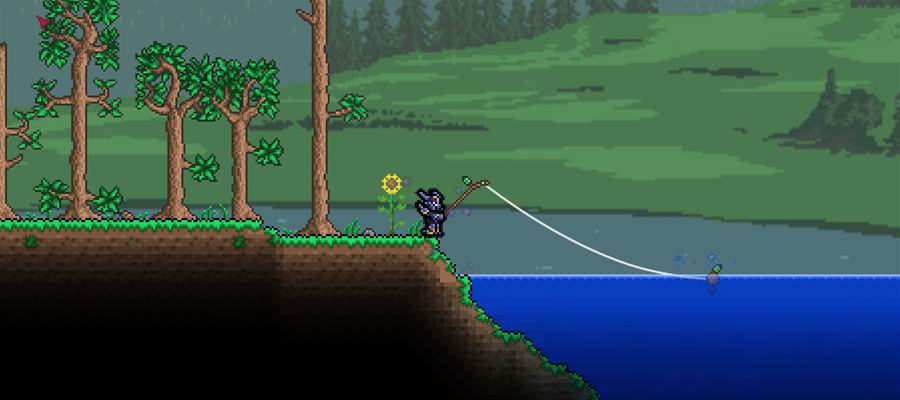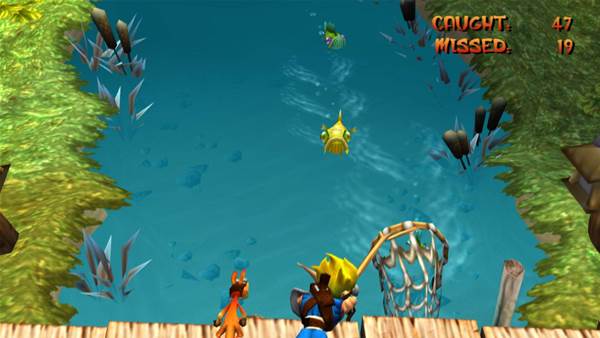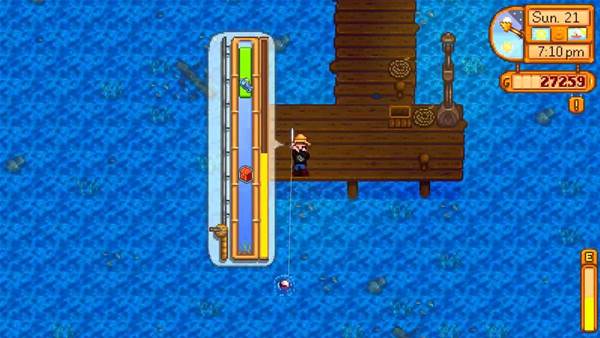Why I love fishing mini games
One fish, two fish, three fish, more...

Some people play games for the competition or the challenge; I play games to relax. So when I’m working my way through a combat-focused RPG and I’m offered the chance to sit by a river for a while and throw in a line, I am absolutely going to take advantage of that fishing minigame.
RPGs feature a range of distractions from their main storylines, but fishing is a particularly common choice. And a lot of thought seems to go into creating unique, interesting fishing mechanics. There are plenty of hack-and-slash combat systems out there, but it’s rare to find two fishing minigames that work the exact same way.
I recently started pondering the recurrence of fishing while playing a silly game - Discord Defender. If you aren’t familiar, Discord Defender is a text-based RPG based in the chat client Discord, and played by sending commands to a bot. In addition to fishing, you can mine, chop wood, trap animals, catch pets, go on adventures, and complete many other classic RPG activities, all from within a chat window. Fishing is the first real way to make an income in the game. As one of my fellow players said, ‘Once you can fish, the game really opens up.’
Frequently, fishing is a ‘special’ non-combat activity, even in games with many options for pastimes. It might be the best way to make money, the first non-combat option available to players, or the only type of non-combat quest within a game. Terraria features many boss fights for players to engage in, but the only explicit quests in the game involve fishing in particular areas to bring special fish back to the angler. Other collectibles, like strange plants, can be given to NPCs for rewards, but these are depicted as less important, if only by the fact that these objectives aren’t explicitly given to the player alongside a time limit for completion.
Terraria’s fishing is all about external conditions; once those are set, the act of fishing itself is quite easy. Your fishing rod, bait, level of fishing power, potions, lake size, and biome choice all alter the results, but once these are prepared, you simply throw your line into a pool of water and wait until you get a bite.
This is different to fishing in a game like Jak and Daxter. The fisherman’s quest requires the player to use a net to collect fish and avoid eels as they quickly swim downstream. Once the objective of 200 pounds of fish has been met once, the player can no longer participate in the minigame, and no similar experiences exist later in the game.

Fishing is often situated outside the rest of the game; these activities use unique mechanics, exist in a separated environment, and reveal items that can’t be acquired any other way. Fishing is the only bonus activity in Dark Cloud, it’s one of the only pauses in the action of NieR: Automata, and is even a unique component within games that are deliberately trying to avoid combat, like Yonder: The Cloud Catcher Chronicles.
Sign up to the GamesRadar+ Newsletter
Weekly digests, tales from the communities you love, and more
But I think my favourite fishing minigame is in Stardew Valley. Fishing in Stardew Valley combines the variations between biomes (and seasons) of a model like Terraria’s with the player control of minigames like the one in Jak and Daxter. Fishing in Stardew Valley gives items that are useful and valuable, but also a general sense of satisfaction once you succeed.
And Stardew Valley also has a mechanic I haven’t seen before: while some games allow for player-control when reeling in a fish, like moving a fishing line through the water, the meter in Stardew Valley offers that same effect while also providing additional feedback. Once you have been fishing in-game often enough, you can determine what species of fish you are about to catch based on how it pulls, with common fish like the carp moving very little, while legendary fish are almost impossible to catch until the player has upgraded their equipment.

It’s the mixture of active participation in both the preparation and catching processes that makes fishing in Stardew Valley feel significant, and the resulting achievement that comes from catching the fish you were looking for is increased as a result.
Fishing appeals to the collector in me, works as a break from combat (that I typically don’t care about) or other ‘standard’ game mechanics, and is often one of the most innovative features within otherwise mechanically predictable RPGs. Fishing minigames are a relaxing break within a break, an extra step removed from the real life that games help us to escape. I don’t think I will stop comparing games based on their fishing mechanics anytime soon.


